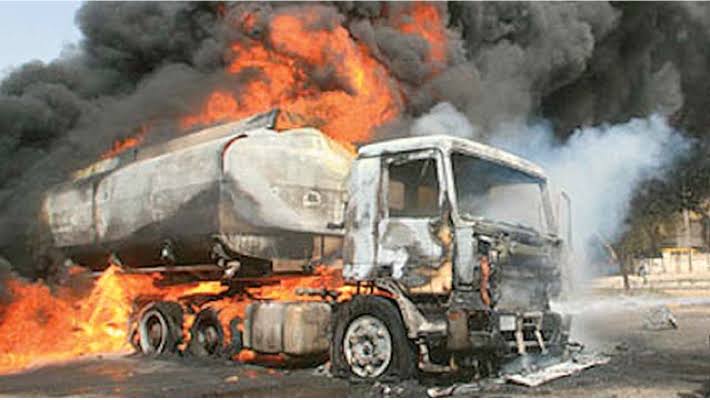The frequency of Petrol tanker explosions in Nigeria has become a disturbing trend, leaving a trail of destruction, death, and devastation in its wake. The latest incident involved a Compressed Natural Gas (CNG) tanker which exploded on the Abuja-Keffi Road in the North Central of Nigeria last week causing enormous devastation, with numerous vehicles burnt and human lives lost.
This incident is just one of many, with similar explosions occurring in Lagos, Onitsha, Lokoja, and Enugu, among other places in Nigeria.
The Lagos tanker explosion in 2019 resulted in the loss of 12 lives and 53 vehicles. That of Onitsha in Anambra state, south east Nigeria, in the same year, killed seven people and destroyed several buildings. According to officials of the Federal Road Safety Corps, FRSC, in 2020, twenty-three lives were lost and ten vehicles burnt in a Lokoja incident of tanker explosion; this is not forgetting the infamous Ugwu Onyema section of the Enugu-Onitsha Expressway incident which took the lives of 31 people with 18 victims burnt beyond recognition.
At the heart of this problem lies a combination of human error, infrastructure decay, and regulatory lapses on the side of the authorities saddled with responsibilities of ensuring safety on the roads. Poor road conditions, reckless driving, and poorly maintained tankers are, without doubt, a ticking time bomb, waiting to unleash destruction on road users.
The effects of these explosions are far-reaching, with devastating consequences for the environment, the nation’s economy, and human lives. The environment suffers from air and water pollution, soil contamination, and loss of biodiversity.
The recent instances of petrol tanker explosions in Nigeria are a stark reminder of the urgency of the issue. So, what can be done to address this scourge?
Firstly, the regulatory agencies such as the Nigeria Midstream and Downstream Petroleum Regulatory Authority (NMDPRA), the Nigeria Union of Petroleum and Natural Gas Workers Union (NUPENG) and the Federal Road Safety Corps (FRSC) must enforce safety regulations and standards for tanker drivers and owners. This can be achieved through regular inspections, licensing, and penalties for non-compliance. Ensuring that tanker drivers and owners adhere to safety standards is crucial in preventing explosions.
Regular maintenance of tankers is also essential in preventing mechanical failures that can lead to explosions. Tanker owners must ensure that their vehicles are regularly inspected and maintained to prevent breakdowns. This can be achieved through routine checks, replacement of worn-out parts, and adherence to manufacturer’s guidelines.
Making it mandatory for drivers to undergo regular training on safe driving practices, vehicle maintenance, and emergency response for procedures is imperative in efforts to ensure safety on the roads. Such training will equip drivers with the necessary skills to handle emergency situations and prevent explosions and human-related accidents. Additionally, public awareness campaigns should be launched to educate the general public on the dangers of petrol tanker explosions and the importance of safety precautions.
In the long term, the government must invest in infrastructure development, including the construction of good roads, bridges, and tanker parks. Another salient means of transportation that will help in reducing the carnage on our roads is the availability of a robust rail system in Nigeria. This will reduce the risk of accidents and explosions caused by poor road conditions.
Exploring alternative transportation modes, such as pipelines, can reduce the nation’s reliance on tankers and minimise the risk of explosions.
Mitigating petrol tanker explosions in Nigeria requires a multi-faceted approach that involves regulatory enforcement, regular maintenance of vehicles, training and re-training of tanker drivers, public awareness creation, infrastructure development, alternative transportation modes, tanker fleet replacement, and emergency response planning.
By implementing these measures, Nigeria can reduce the frequency and impact of petrol tanker explosions, saving lives, property, and the environment.



Comments are closed.